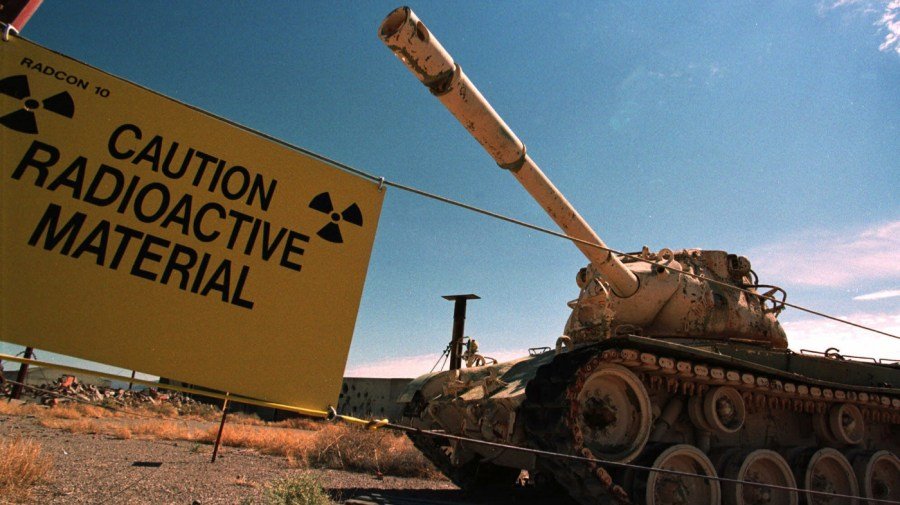
For better or for worse, strategic nuclear weapons are back on the docket.
Given that the Cold War ended 35 years ago, most Americans have little understanding of or interest in these weapons that could literally obliterate much if not all of our society. The marvelous Stanley Kubrick movie “Dr. Strangelove” satirized the notion of mutual assured destruction and the Soviet Union’s “doomsday device” that, once triggered, would destroy the world.
During the Cold War, the image of two scorpions in a bottle, representing the U.S. and Soviet Union, was popularized, meaning both could sting the other to death. Decades later, at least three scorpions inhabit that bottle, with the addition of China pursuing a serious strategic nuclear arsenal rivaling that of the other two military superpowers.
If not in the same bottle, certainly in the same room are the other nuclear states: Britain, France, North Korea, Israel, India and Pakistan. Iran and Saudi Arabia are in the anteroom.
Now, these strategic nuclear matters have been brought to a head by the expiration of the New START Treaty in January and President Trump’s confusing and unhelpful comment that the U.S. will resume testing its nuclear weapons.
The New START treaty limited both the U.S. and Russia to 1,550 deployed nuclear warheads and 800 deployed and non-deployed launchers. Russian President Vladimir Putin has proposed a voluntary extension of the treaty limits on warheads and launchers.
Trump’s comments on testing have completely disrupted the arms control process. By testing, does Trump mean actually exploding current warheads? Does he mean continuing the non-critical testing that does not require actual fission or fusion to take place? Or does he mean testing launchers?
If he’s talking about explosive testing, virtually all experts regard that as highly dangerous and unnecessary.
Worse, in response to Trump’s proposal to build a Golden Dome around and over America to defend against missile or bomber attacks, Putin held a press conference discussing Russia’s efforts surrounding the Skyfall and Poseidon missiles.
Skyfall is NATO’s designation for a nuclear powered, nuclear tipped cruise missile with nearly unlimited range. Poseidon is a nuclear powered, nuclear tipped unmanned underwater torpedo with transoceanic range.
While Skyfall is subsonic, flying feet above the surface, it could attack from any direction. Poseidon could sail undetected into U.S. harbors — say New York or San Francisco — and detonate a multi-megaton warhead.
Megaton weapons can deliver 1,000 times more explosive power than the two nuclear bombs dropped on Japan in 1945. Multiple Poseidon attacks could destroy the American economy.
The strategic nuclear balance has been further complicated by conventional weapons with the capacity to strike and destroy these systems with pinpoint accuracy — cruise missiles such as Tomahawk and long-range convention bombs that can be launched at significant distances from targets. None of these have been included in arms control agreements, and the U.S. abrogated the Anti-Ballistic Missile Treaty in 2001.
The U.S. government has also lost experts who were deeply engaged in these issues. For example, not one of the current Joint Chiefs of Staff has any experience along these lines, as strategic arms control has not been a high priority. The same is true in the White House.
China, so far, has been unwilling to engage in arms control talks, probably waiting until it has expanded its own nuclear capability to a certain level. So under these circumstances, what if anything, can be done beyond leaders agreeing that nuclear weapons can never be used and nuclear war can never be fought?
The options are not good. Engagement with China must continue. Perhaps agreements for mutual inspection of nuclear systems to ensure safety and reliability can begin confidence-building measures. Military-to-military talks on nuclear issues and safeguards are always a good idea. However, given Russia’s intervention in Ukraine, is anyone willing to raise this possibility?
The only concrete step is to ensure that kinetic nuclear testing — namely exploding warheads underground or on the surface and in the air — remains forbidden. Otherwise, a new and unwanted and potentially threatening arms race will be on, and that cannot be permitted.
Harlan Ullman, Ph.D. is UPI’s Arnaud deBorchgrave Distinguished Columnist, a senior advisor at the Atlantic Council, the chairman of two private companies and the principal author of the doctrine of shock and awe. He and former United Kingdom Defense Chief David Richards are the authors of a forthcoming book on preventing strategic catastrophe.


